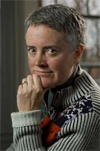The Center for Public Policy and Administration (CPPA) has been recognized as top in country when it comes to social equity research, teaching and service.
The distinction comes from the National Association of Schools of Public Affairs and Administration. Its Social Equity Award, new this year, was created to honor a public affairs, public administration and/or public policy program with a comprehensive approach to integrating social equity into its academic and practical work.
“We are very honored to be the first program to receive this award from our professional association,” says CPPA Director M.V. Lee Badgett. “CPPA’s students, staff and faculty build a social justice component into everything we do: our courses, our research and our public engagement. We’re not here only to study public policy; we want our work to make a difference in people’s lives.”
The Center’s research spans many disciplines. Much of that scholarship examines existing social inequities, such as environmental harms, employment discrimination, health disparities, gender inequalities, marriage access inequalities, and the digital divide. But CPPA’s faculty members go beyond studying these fields; they proactively seek possible policy remedies for these inequities.
For example, political science and public policy professor Jane Fountain chaired the Global Agenda Council on the Future of Government for the World Economic Forum in 2010 and 2011. She has worked with leaders from nongovernmental organizations around the world on such social equity issues as government openness and citizen engagement, as well as social enterprise models for economic development across the globe.
Badgett is widely recognized as an authority on civil rights protections for lesbian, gay, bisexual and transgender people. She was the first economist to publish an article identifying the gay wage gap. In 2009 Badgett’s award-winning book When Gay People Get Married: What Happens When Societies Legalize Same-Sex Marriage was published, and the following year she testified as an expert witness in the federal Proposition 8 trial related to same-sex marriage in California.
Scholarship from CPPA faculty and staff also includes: examining educational equity, by Kathryn A. McDermott and Brenda Bushouse; analyzing the economics of environmental issues and class-based health disparities, by Michael Ash, Krista Harper and Sylvia Brandt; studying the role of technology in public life across the globe, by Martha Fuentes-Bautista and Charles Schweik; and looking at various forms of economic and political inequality throughout the world, by Joya Misra, Nancy Folbre and David Mednicoff.
In addition to the faculty’s research, the Center works to advance social justice goals on the UMass Amherst campus and throughout the region. Through its Springfield Initiative, CPPA lecturer Fred Rose is working with community leaders to establish an economic development process that would create worker cooperatives, offering inner-city residents well-paying entry-level jobs.
Students are also actively engaged in CPPA’s social equity endeavors. For example, they collaborate with faculty and staff on the Center’s Diversity and Social Justice Committee, which works to ensure that CPPA events and operations engage the wider community in social justice issues. The committee has helped with efforts such as recruiting a diverse student body and incorporating social justice themes in the curriculum.
Since its founding in 1998, CPPA has placed a strong focus on issues of social justice and diversity. “Our mission includes promoting social change and solving problems for the common good,” Badgett says.
The award lends prestige not only to CPPA, but also to the College of Social and Behavioral Sciences (SBS), which houses the Center. “I am so proud that CPPA has won this award. Congratulations to Lee for her fine leadership,” says SBS Dean Robert S. Feldman.
CPPA is the hub of interdisciplinary public policy research, teaching and engagement at UMass Amherst. Its faculty and alumni are effective policy leaders, from the local to the global levels, in addressing topics such as family and care policy, environmental issues, emerging technologies, social inequalities and governance.
 The Center for Public Policy and Administration will welcome Daniel Tygel, a leading Brazilian solidarity thinker and organizer, to campus on April 26. Tygel will give a public lecture titled “Building a Solidarity Economy for People and Planet: Views from Brazil.”
The Center for Public Policy and Administration will welcome Daniel Tygel, a leading Brazilian solidarity thinker and organizer, to campus on April 26. Tygel will give a public lecture titled “Building a Solidarity Economy for People and Planet: Views from Brazil.”



 Environmental justice champion Nia Robinson will kick off the Five College collaborative public policy practitioner residency program this semester. Robinson will spend the first two weeks of March on the campuses of each of the five colleges, offering lectures, participating in panel discussions and leading teach-ins.
Environmental justice champion Nia Robinson will kick off the Five College collaborative public policy practitioner residency program this semester. Robinson will spend the first two weeks of March on the campuses of each of the five colleges, offering lectures, participating in panel discussions and leading teach-ins.